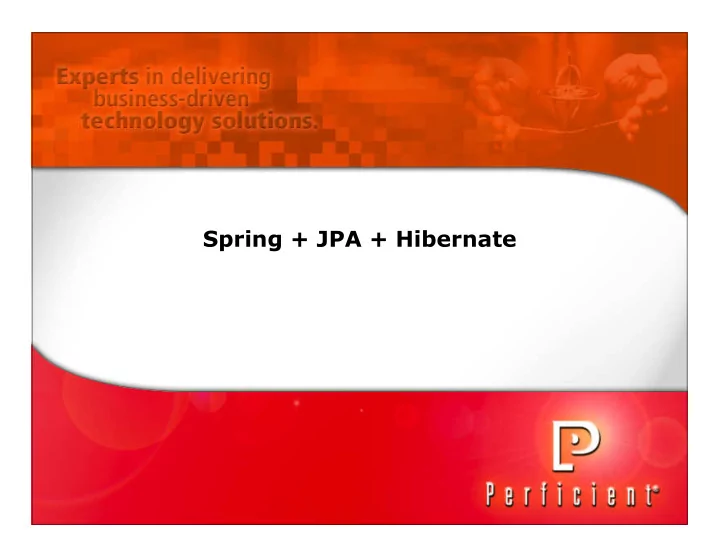

Spring + JPA + Hibernate
Agenda Persistence –JdbcTemplate –Hibernate JPA Spring – Spring 2.x – JPA features
J2EE 1.4 Reality Check Common Technology Stack – Spring (IoC) – Hibernate (Light-Weight Persistence) – Stateless EJB
JPA – Java Persistence API JEE 5 / EJB3 Persistence Provides an ORM framework similar to Hibernate / JDO Good Bye Entity Beans!!!
Spring Persistence Spring JDBC Spring Hibernate Spring JPA Spring iBatis 5
Issues with SQL SQL isn’t hard... just tedious redundant... repeating code 6
Focus DRY - Don’t Repeat Yourself Testable Concise Stop forcing all the checked exceptions 7
JDBCTemplate 8
Remaining Challenges? Testability... – in-memory DB – HSQLDB vs. Oracle – The code is tied to a dialect! 9
ORM - The Good Object Relational Mapping – Makes the Dialect configurable! – Testable – Used to increase time to market 10
ORM - The Good Issues / Warnings – Forces compromises in the relational datastore • primary keys • triggers • ... – Lazy vs. Eager decisions – As the project grows the ORM pain grows 11
And the winner is... Hibernate Hibernate was the clear winner in the ORM race... However it wasn’t a standard... 12
Spring Provides Hibernate Support 13
Spring Hibernate Template 14
Spring HibernateDaoSupport 15
Spring HibernateTransactionManager 16
Hibernate Consequences XML focused – at least at the time Not standard Alternatives: JDO – Focused on ubiquitous data access instead of relational 17
JPA 18
JPA Benefits Standards-Based No Descriptors necessary Annotated POJOs Detached Object Support – Reduce Overhead of DTO / VO Improve Testability
JPA - Specification Packaging Entities Entity Operations Queries Metadata Life-cycle Model Callbacks
Persistence.xml In the classpath under the META-INF directory. <persistence-unit name="unit1" transaction-type="RESOURCE_LOCAL"> <provider>org.hibernate.ejb.HibernatePersistence</provider> <properties> <property name="hibernate.hbm2ddl.auto" value="create"/> <property name="hibernate.ejb.autodetection" value="class"/> <property name="hibernate.connection.url" value="jdbc:hsqldb:hsql://localhost:1234/employee"/> <property name="hibernate.connection.driver_class" value="org.hsqldb.jdbcDriver"/> <property name="hibernate.connection.username" value="sa"/> <property name="hibernate.connection.password" value=""/> </properties> </persistence-unit> </persistence>
Entity Requirements Must be annotated an Entity Public or Protected No-arg Constructor Must not be final – No final methods or variables Must be Serializable to be detached and serialized…
Persistent Fields Primitives and Strings – automatically become columns in the database Object fields – must be mapped by joins and foreign key relationships Fields marked transient are not persisted Fields annotated @Transient are not persisted
Customer Entity (from spec) @Entity(access=FIELD) public class Customer { @Id(generate=AUTO) Long id; @Version protected int version; @ManyToOne Address address; @Basic String description; @OneToMany(targetEntity=com.acme.Order.class, mappedBy="customer") Collection orders = new Vector(); @ManyToMany(mappedBy="customers") Set<DeliveryService> serviceOptions = new HashSet(); public Customer() {} public Collection getOrders() { return orders; } public Set<DeliveryService> getServiceOptions() {
POGO for Exceptional Terseness 25
JPA Persistence Interfaces EntityManager – Interface to interact with persistence context. – @PersistenceContext EntityManagerFactory – Creates an EntityManager – @PersistenceUnit
Entity Manager void persist(Object entity); <T> T merge(T entity); void remove(Object entity); <T> T find(Class<T> entityClass, Object primaryKey); <T> T getReference(Class<T> entityClass, Object primaryKey); void flush(); void refresh(Object entity); boolean contains(Object entity); void close(); boolean isOpen(); EntityTransaction getTransaction();
Acquiring a Manager Injection in Stateless Bean @PersistenceContext public EntityManager em; OR @PersistenceContext(unitName="order") EntityManager em; From Java Application EntityManagerFactory emf = Persistence. createEntityManagerFactory ("unit1"); EntityManager em = emf.createEntityManager();
JPA Query JPQL Example: public List<Session> findSessionByCatagory(String name) { return entityManager.createQuery ( "from Session session where session.catagory.name=:name") .setParameter("name", name).getResultList(); }
JPA Challenges 2 Programming Models – Standalone application – container managed Bootstrapping 30
Spring 2.x Spring 2 introduces JPA support
Spring - JPA Relationship Persistence.xml JpaTemplate Query Persistence persist() EntityManager find() EntityManager merge() Factory delete() EntityManagerFactoryBean Transaction 4
Spring 2 JPA Support org.springframework.orm.jpa package – Contains subset of the JPA container JpaDaoSupport – similar to other DAO support classes like HibernateDaoSupport LocalEntityManagerFactoryBean – Provides resource bootstrapping for non-jndi lookups
Spring / JPA Approaches JpaDaoSupport Approach – Not preferred approach – Similar to HibernateDaoSupport – Requires Spring Configuration of the EntityManager Pure JPA Approach – Preferred approach – No spring references necessary in the code • with the exception of @Transactional 34
Approach 1: JpaDaoSupport Provides great support with JpaDaoSupport with JpaTemplate to simplify common code –very familiar to hibernate developers Consequences: –import of spring framework • not exactly POJO –requires spring configuration of entitymanager
JpaDaoSupport Example: SpeakerDaoImpl package com.nfjs.jpa; import java.util.List; import org.springframework.orm.jpa.support.JpaDaoSupport; public class SpeakerDAOImpl extends JpaDaoSupport implements SpeakerDAO { public Speaker findSpeaker(long id) { return getJpaTemplate().find(Speaker.class,id); } public List<Speaker> findSpeakerByCatagory(String catagory) { return getJpaTemplate().find("select distinct s from Speaker s, Session session where session.catagory.name=?1 and session.speaker.id = s.id",catagory); } 36
Spring JpaDaoSupport Configuration <bean id="entityManagerFactory" class="org.springframework.orm.jpa.LocalEntityManagerFactoryBean“ > <property name="persistenceUnitName" value="unit1"/> </bean> <bean id="speakerDao" class="com.codementor.jpa.domain.SpeakerDAOImpl"> <property name="entityManagerFactory" ref="entityManagerFactory"/> </bean> <bean id="transactionManager" class="org.springframework.orm.jpa.JpaTransactionManager"> <property name="entityManagerFactory" ref="entityManagerFactory“ / > </bean> <tx:annotation-driven transactionManager=“transactionManager” />
Approach 2: Spring / Pure JPA Configuration Leverage the persistence.xml in classpath:/META-INF <bean id="entityManagerFactory" class="org.springframework.orm.jpa.LocalEntityManagerFactoryBean" > <property name="persistenceUnitName" value="unit1"/> </bean> DAO with no Spring references, however it contains @PersistenceContext annotated EntityManager <bean id="conferenceDao" class="com.codementor.jpa.domain.ConferenceDAOImpl"/> Spring configuration which injects JPA annotationed EntityManager <bean class="org.springframework.orm.jpa.support.PersistenceAnnotationBeanPostProces sor“ />
Pure JPA Code Example: ConferenceDaoImpl package com.nfjs.jpa; import java.util.List; import javax.persistence.EntityManager; import javax.persistence.PersistenceContext; import org.springframework.transaction.annotation.Transactional; public class ConferenceDAOImpl implements ConferenceDAO { @PersistenceContext private EntityManager entityManager; public void setEntityManager(EntityManager entityManager) { this.entityManager = entityManager; } – ... 39
Pure JPA Spring Configuration <bean id="entityManagerFactory" class="org.springframework.orm.jpa.LocalEntityManagerFactoryBean" > <property name="persistenceUnitName" value="nfjs"/> </bean> <bean id="conferenceDao" class="com.nfjs.jpa.ConferenceDAOImpl"/> <bean class="org.springframework.orm.jpa.support.PersistenceAnnotationBeanPostProcessor" /> </beans> 40
Recommend
More recommend